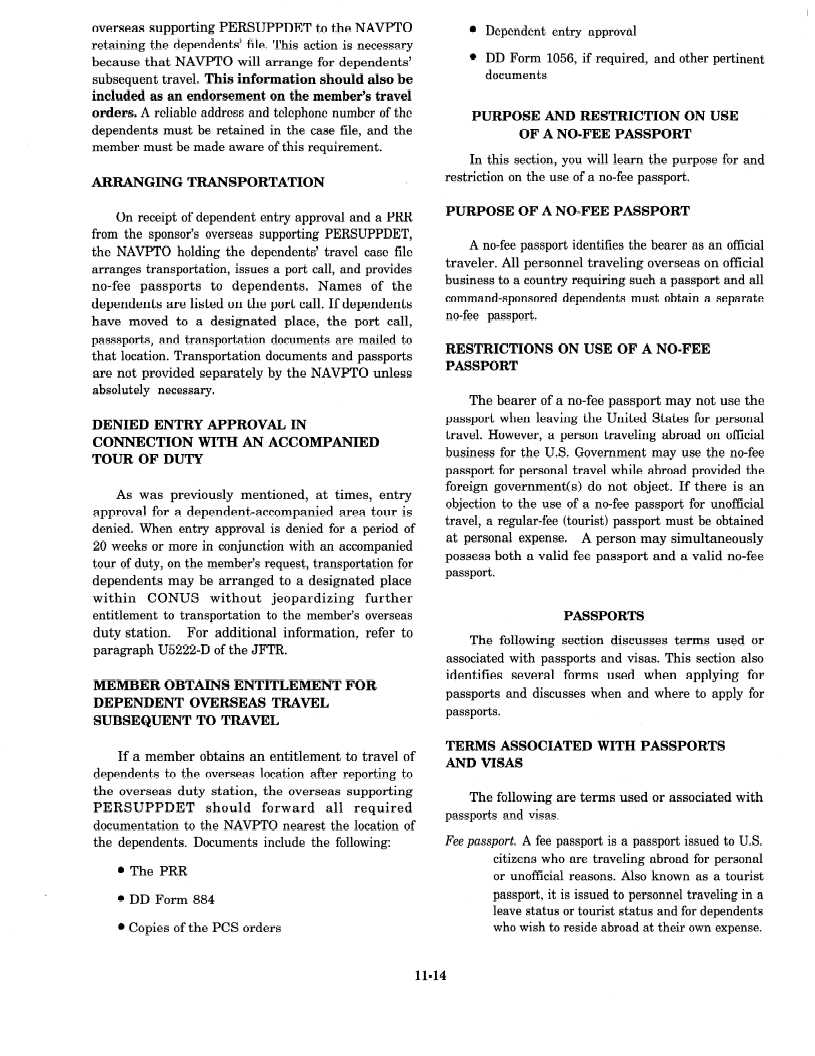| |
overseas supporting
PERSUPPDET
to the NAVPTO
retaining
the dependents’ file. This action is necessary
because. that NAVPTO
will
arrange
for dependents’
subsequent travel. This information
should
also be
included
as an endorsement
on the member’s travel
orders.
A reliable address and telephone number of the
dependents must be retained
in the case file, and the
member< must be made aware of this requirement.
ARRANGING
TRANSPORTATION
On receipt of dependent entry approval and a PRR
from the sponsor’s overseas supporting
PERSUPPDET,
the NAVPTO
holding
the dependents’ travel
case file
arranges transportation,
issues a port call, and provides
no-fee
passports
to
dependents.
Names
of the
dependents
are listed on the port call. If dependents
have
moved
to a designated
place,
the port
call,
passsports, and transportation
documents are mailed to
that location. Transportation
documents and passports
are not provided
separately
by the NAVPTO
unless
absolutely
necessary.
DENIED
ENTRY
APPROVAL
IN
CONNECTION
WITH
AN ACCOMPANIED
TOUR
OF DUTY
As was previously
mentioned,
at times,
entry
approval
for a dependent-accompanied
area tour is
denied. When entry approval
is denied for a period of
20 weeks or more in conjunction
with an accompanied
tour of duty, on the member’s request, transportation
for
dependents
may be arranged
to a designated
place
within
CONUS
without
jeopardizing
further
entitlement
to transportation
to the member’s overseas
duty station.
For additional
information,
refer
to
paragraph
U5222-D of the JFTR.
MEMBER
OBTAINS
ENTITLEMENT
FOR
DEPENDENT
OVERSEAS
TRAVEL
SUBSEQUENT
TO TRAVEL
If a member obtains
an entitlement
to travel
of
dependents to the overseas location after reporting
to
the overseas
duty
station,
the overseas supporting
PERSUPPDET
should
forward
all
required
documentation
to the NAVPTO nearest the location of
the dependents.
Documents include
the following:
l
The PRR
l
DD Form 884
l
Copies of the PCS orders
l
Dependent entry approval
l
DD Form 1056, if required,
and other pertinent
documents
PURPOSE
AND RESTRICTION
ON USE
OF A NO-FEE
PASSPORT
In this section, you will learn the purpose for and
restriction
on the use of a no-fee passport.
PURPOSE
OF A NO-FEE
PASSPORT
A no-fee passport identifies the bearer as an official
traveler.
All personnel
traveling
overseas on official
business to a country requiring
such a passport and all
command-sponsored dependents must obtain a separate
no-fee passport.
RESTRICTIONS
ON USE OF A NO-FEE
PASSPORT
The bearer of a no-fee passport
may not use the
passport when leaving the United
States for personal
travel. However,
a person traveling
abroad on official
business for the U.S. Government
may use the no-fee
passport for personal travel while
abroad provided the
foreign
government(s)
do not object. If there
is an
objection to the use of a no-fee passport for unofficial
travel, a regular-fee (tourist) passport must be obtained
at personal expense.
A person may simultaneously
possess both a valid
fee passport
and a valid
no-fee
passport.
PASSPORTS
The followi .ng section
discusses
terms
used or
associated with
passports and visas. This section also
identifies
several
forms
used
when
applying
for
passports and discusses when and where to apply for
passports.
TERMS
ASSOCIATED
WITH
PASSPORTS
AND VISAS
The following
are terms used or associated with
passports and visas.
Fee passport. A fee passport is a passport issued to U.S.
citizens who are traveling
abroad for personal
or unofficial
reasons. Also known as a tourist
passport, it is issued to personnel traveling
in a
leave status or tourist status and for dependents
who wish to reside abroad at their own expense.
11-14
|

